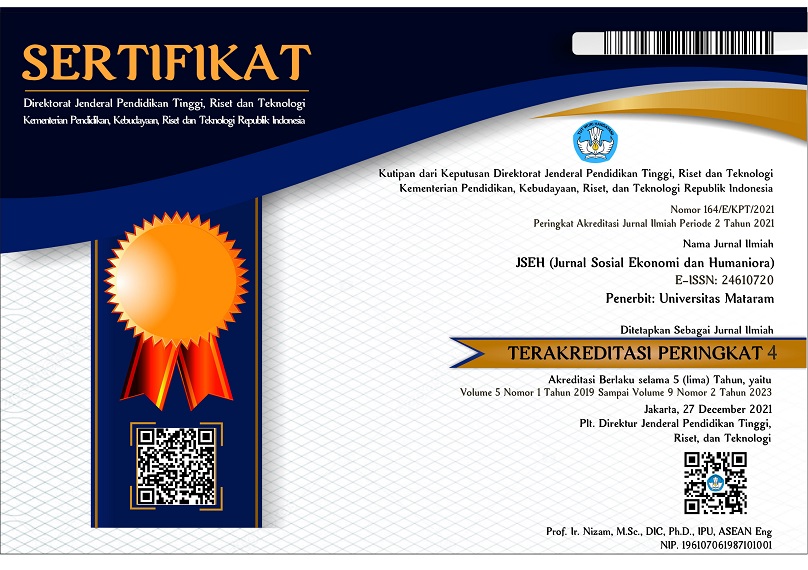Pemanfaatan Teknologi Informasi dan Komunikasi Guna Mengendaikan Pola Perilaku Konsumtif Santri Pondok Pesantren Nurul Jadid
DOI:
https://doi.org/10.29303/jseh.v8i1.23Abstract
Information and communication technology that is developing so quickly directly affects the community, including in the world of Islamic boarding schools. Currently, Islamic boarding schools participate in utilizing the development of information technology to improve the quality of their pesantren. The Nurul Jadid Islamic Boarding School in utilizing the rapid development of technology created an E-Bekal program which aims to control the consumptive behavior of students. By using qualitative methods, this research is expected to optimize the use of information technology in order to control the extravagant behavior of the students of the Nurul Jadid Islamic Boarding School in Paiton Probolinggo. The E-Bekal program can regulate the amount of student consumption expenditure, because the program has a maximum daily spending limit of students according to the policies set by the pesantren. With the same maximum limit for all students, the consumptive behavior of students can be controlled so that students do not behave extravagantly. Benefits for guardians of students can make it easier to control the financial expenses of students. and can find out how much they spend each time they make a purchase through notifications sent to their parents through the E-Bekal application installed on Android. You can also find out how much balance is owned by students. Parents (santri's guardians) can top up the balance of the student's provision money through a bank that has been determined by the pesantren.
References
Abdurrahman, Z. (n.d.). Teori Maqasid Al-Syatibi Dan Kaitannya Dengan Kebutuhan Dasar Manusia. 19.
Baharun, H., & Intania, I. (2020). INTERAKSI SIMBOLIK DAN IMAJI RELIGIOUS DALAM MEMBANGUN CITRA PONDOK PESANTREN NURUL JADID. Atthulab: Islamic Religion Teaching and Learning Journal, 5(1), 71–85. https://doi.org/10.15575/ath.v5i1.7317
Bahri, B., Patahuddin, P., Asmunandar, A., & Aulia, A. W. (2020). Sejarah Pondok Pesantren DDI Pattojo di Kabupaten Soppeng (1947-2018). Criksetra: Jurnal Pendidikan Sejarah, 9(1), 82–94. https://doi.org/10.36706/jc.v9i1.10935
Betawi, U. (2018). MAQASHID AL-SYARIAH SEBAGAI DASAR HUKUM ISLAM DALAM PANDANGAN AL-SYATIBI DAN JASSER AUDHA. . . NOVEMBER, 6(6), 12.
Budiman, H. (2017). Peran Teknologi Informasi Dan Komunikasi Dalam Pendidikan. Al-Tadzkiyyah: Jurnal Pendidikan Islam, 8(1), 31. https://doi.org/10.24042/atjpi.v8i1.2095
Cholik, C. A. (2017). PEMANFAATAN TEKNOLOGI INFORMASI DAN KOMUNIKASI UNTUK MENINGKATKAN PENDIDIKAN DI INDONESIA. 2(6), 10.
Furqon, I. K. (2018). TEORI KONSUMSI dalam ISLAM. Adzkiya : Jurnal Hukum dan Ekonomi Syariah, 6(1). https://doi.org/10.32332/adzkiya.v6i1.1169
Ghufron, M. I., & Ishomuddin, K. (n.d.). KOSMARA: Konsep Pengembangan Ekonomi Pesantren dan Pengendalian Pola Perilaku Konsumtif Santri di Pondok Pesantren Nurul Jadid. . . Vol., 15.
Huda, I. A. (2020). Perkembangan Teknologi Informasi dan Komunikasi (TIK) Terhadap Kulaitas Pembelajaran Di Sekolah Dasar. 2, 5.
Kurniawan, C. (2017). ANALISIS FAKTOR-FAKTOR YANG MEMPENGARUHI PERILAKU KONSUMTIF EKONOMI PADA MAHASISWA. 13(4), 12.
Lestarina, E., Karimah, H., Febrianti, N., Ranny, R., & Herlina, D. (2017). Perilaku Konsumtif di Kalangan Remaja. JRTI (Jurnal Riset Tindakan Indonesia), 2(2). https://doi.org/10.29210/3003210000
Liling, A. (2019). Konsep Utility Dalam Prilaku Konsumsi Muslim. BALANCA : Jurnal Ekonomi dan Bisnis Islam, 1(1), 71–91. https://doi.org/10.35905/balanca.v1i1.1040
Nahdi, D. S., Rasyid, A., & Cahyaningsih, U. (2020). MENINGKATKAN KOMPETENSI PROFESIONAL GURU MELALUI PENGEMBANGAN MEDIA PEMBELAJARAN BERBASIS TEKNOLOGI INFORMASI. BERNAS: Jurnal Pengabdian Kepada Masyarakat, 1(2), 76–81. https://doi.org/10.31949/jb.v1i2.234
Pohan, M. (2021). Pengaruh Konsep Diri, Kelompok Teman Sebaya, Gaya Hidup Terhadap Perilaku Konsumtif Dimoderasi Literasi Keuangan. 18.
Prajana, A., & Astuti, Y. (2020). Pemanfaatan Teknologi Informasi dan Komunikasi Dalam Pembelajaran oleh Guru SMK Di Banda Aceh dalam Upaya Implementasi Kurikulum 2013. JINOTEP (Jurnal Inovasi dan Teknologi Pembelajaran): Kajian dan Riset Dalam Teknologi Pembelajaran, 7(1), 33–41. https://doi.org/10.17977/um031v7i12020p033
Setiawan, D. (2018). Dampak Perkembangan Teknologi Informasi dan Komunikasi Terhadap Budaya. JURNAL SIMBOLIKA: Research and Learning in Communication Study, 4(1), 62. https://doi.org/10.31289/simbollika.v4i1.1474
Syafiih, M., Dianita, D., Arifah, M., Fu’adi, S. Q., Agustin, T., Putri, V. V., & Hidayati, N. (2021). Pemahaman Aplikasi E-Bekal bagi Wali Asuh Santri sebagai Upaya Pencegahan Penyalahgunaan Uang Belanja Santri di Pesantren. 15.
Ulum, M., Nastiti, N. D., & Muazzaroh, F. (2021). [No title found]. Jurnal Istiqro, 7(2), 172. https://doi.org/10.30739/istiqro.v7i2.908
Yanti, I. (2018). Analisis Pengaruh Faktor Psikologis dan Religiusitas Perilaku Muslimah Kota Medan terhadap Konsumsi Kosmetik Halal dan Baik. AT-TAWASSUTH: Jurnal Ekonomi Islam, 1(1), 294. https://doi.org/10.30821/ajei.v1i1.2751
Zaimsyah, A. M., & Herianingrum, S. (2019). TINJAUAN MAQASHID SYARIAH TERHADAP KONSUMSI. Ulumuna: Jurnal Studi Keislaman, 5(1), 22–33. https://doi.org/10.36420/ju.v5i1.3638
Downloads
Published
How to Cite
Issue
Section
License
Copyright (c) 2022 Ahmad Febrianto, Roisul Muhtadin, Luthfi Riadi

This work is licensed under a Creative Commons Attribution-NonCommercial 4.0 International License.








